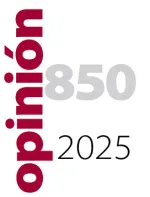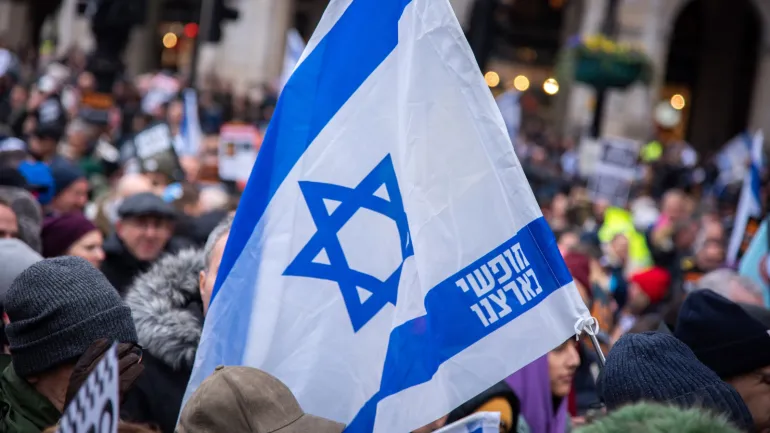The Israeli disinformation that fractures Europe


A tech industry leader and espionage superpower, Benjamin Netanyahu’s Israel is waging a sophisticated disinformation war on European soil through hasbara, its public diplomacy, aiming to impose its version of the war in Gaza and neutralise the growing voices of dissent calling for sanctions. It exploits internal fractures by financing what has been called “the hate algorithm” – on issues ranging from migration and homophobia to Islamophobia or antisemitism – to bolster its ideological allies on the far right, in a climate of digital impunity.
Benjamin Netanyahu was clear at a meeting he held in September with young influencers in New York: “We have to fight back ... We have to use the weapons that apply to the battlefields in which we engage ... and the most important ones are social media”. The priority: team up with the tech magnates of TikTok and X. His words encapsulate his government’s public diplomacy strategy, hasbara: a hybrid war where disinformation is a key weapon to silence, dominate or fracture the global audience. Yet, in spite of that, Israel is losing the battle for the narrative. The day before the meeting, 77 delegations at the UN walked out of the hall as the Israeli prime minister, who is sought by international justice, took the stage. They refused to listen, but they did not deny him the opportunity to speak.
Incapable of justifying to global public opinion 25 months of slaughter in Gaza that has claimed over 70,000 lives, Netanyahu’s government has turned controlling the narrative into a military priority, the infosphere into a battleground, and influencers into soldiers for hire. To do so it has fired up hasbara, allocating €129m for 2025 – a twentyfold increase on the annual budget before the war. In addition, it has signed a contract worth over €5m with the US firm Clock Tower X to create and position content on digital platforms, manipulate algorithms and train artificial intelligence (AI) models like ChatGPT in the global infosphere.
This apparatus is not designed to combat antisemitism, but rather to whitewash a war of extermination in Gaza before the global audience in general, and Europeans in particular. A third of the budget has been spent on funding campaigns denying famine in Gaza and convincing the world that it is all an international antisemitic “conspiracy” where Médecins Sans Frontières, the UN, European countries or reputable Israeli human rights NGOs fabricate photos of dying children. Then there are the attacks from state accounts, like that of the defence minister, Israel Katz, or COGAT – the government unit in charge of both coordinating and blocking humanitarian aid in Gaza – which slander judges of the International Criminal Court, the European Union’s leaders or UN representatives.
Israel has silenced voices inside Gaza too. It has killed over 270 journalists and 560 humanitarian workers and blocked the foreign press from entering, in a media blackout without precedent in modern history save for the one imposed by the Islamic State in its self-proclaimed caliphate in Syria and Iraq. In doing so, it removes inconvenient witnesses to its crimes – and to those of Hamas too. Likewise, it has managed to make up for its limited demographic weight in the global infosphere by turning to allies such as India or tech billionaires like Elon Musk to amplify its narratives. It is a pyrrhic victory.
The Israeli operations are harmful because they are sophisticated; the country is a tech industry leader and a cyber espionage superpower. Remember Pegasus, the Israeli software used to spy on European leaders including Emmanuel Macron or Pedro Sánchez; or “Team Jorge”, led from Tel Aviv by a former member of the Israeli special forces, who through Foreign Information Manipulation and Interference (FIMI) operations boasted of disrupting 27 of the 33 elections they meddled in worldwide, including the consultation on the independence of Catalonia of 2014.
Hasbara exploits, in Europe and in different languages, pre-existing controversial themes such as antisemitism, Islamophobia, abortion, migration, homophobia, or terrorism, aligning itself with the narrative of the far right, while in Hebrew its ministers incite Zionist fanaticism and amplify messianic and genocidal rhetoric. It is telling that Netanyahu’s staunchest global allies are Trump, Orbán and Milei: three white males who lean into a religious and supremacist discourse, and who are well-known for stifling free speech.
Israel has also resorted to sport and culture to whitewash its illegal war in Gaza: €30m to alter the vote in Eurovision or sponsorship from philanthropists close to Netanyahu, as in the case of the Israel-Premier Tech cycling team. In doing so hasbara has helped to radicalise and polarise the global infosphere. And that digital hate speech has turned into real violence. A stark example is the deliberate manipulation of a video that went viral on social media in the wake of violent disturbances in Amsterdam around the football match between Ajax and Maccabi Tel Aviv. Netanyahu used it to accuse Europe of antisemitism and decry “pogroms against Jews”. The aggressors in the video turned out to be Israelis, but the hate speech had already ignited on social media with a hoax that European governments neither refuted nor attributed, as had occurred previously with the disinformation on “40 babies beheaded by Hamas”.
More serious still was the smear campaign Israel launched against the UN agency for Palestinian refugees (UNRWA), where in barely 48 hours and without proof Israel managed to convince 16 donors to freeze their funds. The operation included €7m in surreptitious promotion on Google and YouTube to form a chain to link UNRWA to Hamas, to Islamic State and to the Nazis – even including posters on the streets of Barcelona. The operation has not only dealt a severe blow to the multilateral cooperation system and international law, violating the presumption of innocence, it has also resulted in the loss of life in Gaza as the flow of humanitarian aid was interrupted in the midst of the Israeli offensive. The Zionist diplomatic lobby is also attempting to paralyse multilateral governance, leveraging the system of “vetocracy” to avoid any sanctions from the UN, thanks to the unconditional support of the United States, and from the EU, falling back on Germany’s veto, as in the case of the association agreement, which remains in force in breach of Europe’s own legislation on human rights.
Against this backdrop of impunity, Israel has taken things a step further, launching hybrid attacks in which it combines smear campaigns to link its targets – humanitarian workers or journalists – with Hamas to then “justify” a subsequent attack using weaponised drones. The same strategy has been used to storm the humanitarian flotilla in international waters and then seize and mistreat European passengers. The incorporation of AI to mould the public discourse and algorithms is diminishing audiences’ capacity to distinguish between information, disinformation and interference, and undermining the credibility of European media outlets.
In this asymmetric war of narratives in a post-truth age, fact-checkers are powerless to counter the million-euro disinformation campaigns of the hasbara. The European states, meanwhile, remain silent. There are even governments and leaders in Europe who endorse the Israeli narrative, performing an obscene semantic contortionism in their official statements, according to which in Gaza people are not being killed but “are dying” or “a humanitarian crisis is unfolding” rather than Israeli is imposing an humanitarian blockade. The international silence is not neutral since it serves as an argument to legitimise the crimes of Netanyahu’s government before domestic and international audiences. The same can be said of the so-called “peace plan” presented by Trump (hailed with few qualms by the EU and several Arab countries) that Israel is touting as a victory on social media. It is about getting back to the same narrative that prevailed before 7 October attacks with the Abraham Accords, where the Palestinians remain on the menu, but they have no seat at the table.
Israeli diplomatic pressure has also prompted a restriction of freedom of expression in universities, newsrooms and popular protests in Europe, the United States and Israel itself, normalising self-censorship. Any critical discourse is swiftly labelled as antisemitic – or self-hating Jew– in a discursive manoeuvre that seeks to tie the existence of the State of Israel as the legitimate refuge of the Jewish people to the political survival of Netanyahu’s apartheid and Zionist government. This, perhaps, is its greatest crime: to revive the shared trauma of the Holocaust to drag an entire society along as an accomplice to genocide for the sake of staying in power.
So, when the greatest genocide scholars, like the Israeli Omer Bartov, say Israel is perpetrating one in Gaza, we in Europe engage in semantic debates about whether it is genocide or not, or whether the children of Gaza are dying of starvation or it is “only” those with congenital diseases who are dying of starvation. Hasbara foments these sterile debates to set the news agenda and stifle deeper reflection on the illegality of depriving a defenceless population of food and the consequent need to impose sanctions on Israel.
Europe is the constant target of Chinese and Russian FIMI campaigns hinged around internal fractures; what is unusual is that they come from an ‘international partner’ and that they are not neutralised. These attacks serve to discredit Europe in the eyes of the Global South, undermine international justice and widen the social divide. As long as the EU does not put an end to the digital impunity with which Israel acts against the interests of its citizens, it is to be expected that Tel Aviv will continue interfering in future electoral processes in critical countries, such as Spain, to favor the rise of its far-right ideological allies.
Few writers dare to publicly reflect on the causes of the antidemocratic discourse that Israel and Germany have maintained on Gaza for the past two years for fear of being pursued by the hasbara machine. One of them is the essayist Pankaj Mishra, who calls on us to consider the dangers of constructing national identities from a collective trauma experienced decades ago – be it Nazism or the Holocaust.
The resources invested in the dehumanisation of the Palestinian people– both within and beyond Israel– have culminated today in Israeli politicians openly inciting genocidal intentions with complete impunity.
The late poet Mahmoud Darwish reclaims that “stolen humanity” in his verses, the right to be something more than a response to the occupying power. An aspiration once again denied by Trump’s “peace plan”. Two million Gazans, stripped of all rights, continue to wait for the West to name the injustice that Israel is inflicting upon them, even if only as an obituary for a Palestinian state.
Keywords: Israel, disinformation, post-truth, EU, Europe, antisemitism, digital espionage, Gaza, Netanyahu, infosphere, Team Jorge, narratives, FIMI, interference, freedom of expression, censorship, far right
All the publications express the opinions of their individual authors and do not necessarily reflect the views of CIDOB or its donors
E-ISSN 2014-0843